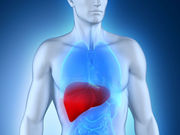At mid-childhood, 23 percent of studied children with high waist circumference had elevated ALT
FRIDAY, April 6, 2018 (HealthDay News) — Increased adiposity in childhood may negatively impact liver function in children as young as 8 years old, according to a study published online April 4 in The Journal of Pediatrics.
Jennifer A. Woo Baidal, M.D., M.P.H., from the Columbia University Medical Center in New York City, and colleagues examined the relationship between early to mid-childhood adiposity measures and mid-childhood alanine aminotransferase (ALT) levels using data from 635 children participating in the Project Viva cohort.
The researchers found that at early childhood, 29 percent had overweight/obesity, and mean waist circumference was 51 cm. At mid-childhood, 23 percent had an elevated ALT (mean ALT was 20.3 units/liter). Each additional 10 cm greater waist circumference at early childhood was associated with 1.99 higher odds of elevated ALT at mid-childhood, in multivariable-adjusted models. Higher ALT at mid-childhood was also associated with greater increases from early to mid-childhood in body mass index z-score, sum of subscapular and triceps skinfold thicknesses, waist circumference, and hip circumference.
“Some clinicians measure ALT levels in at-risk children starting at around 10 years old, but our findings underscore the importance of acting earlier in a child’s life to prevent excess weight gain and subsequent liver inflammation,” Woo Baidal said in a statement. “Currently, the best way for kids and adults to combat fatty liver disease is to lose weight, by eating fewer processed foods, and getting regular exercise. We urgently need better ways to screen, diagnose, prevent, and treat this disease starting in childhood.”
Copyright © 2018 HealthDay. All rights reserved.








